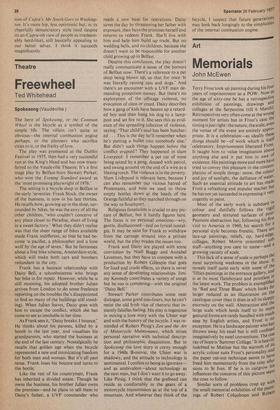Theatre
Freewheel
Ted Whitehead
Spokesong (Vaudeville) ) The hero of Spokesong, or the Common Wheel is the bicycle as a symbol of the simple life. The villain isn't quite so obvious—the internal combustion engine perhaps, or the planners who sacrifice cities to it, or the frailty of love.
The play was premiered at the Dublin Festival in 1975, then had a very successful run at the King's Head and has now transferred to the Vaudeville Theatre. It's a first stage play by Belfast-born Stewart Parker, who won the Evening Standard award as the 'most promising playwright of 1976: The setting is a bicycle shop in Belfast in the early 'seventies. Frank Stock, the owner of the business, is now in his late thirties. He recalls how, growing up in the shop, surrounded by bikes, he was the envy of all the other children, 'who couldn't conceive of any place closer to Paradise, short of living in a sweet factory.' What they didn't realise was that the sheer range of bikes available made Frank indifferent, so that he had become 'a pacifist, a philosopher and a lone wolf by the age of seven.' But he fantasises about a free bike scheme, Amsterdam-style, which will make both cars and bombers redundant in the city.
Frank has a hesitant relationship. with Daisy Bell, a schoolmistress who brings her bike in for repair. However, while he is still mooning, his adopted brother Julian arrives from London to do some freelance reporting on the troubles (he's disappointed to find so many of the buildings still standing). When Julian leaves, Daisy goes with him to escape the conflict, Which she has come to see as insoluble in her time.
As Frank sees it, 'Daisy breaks. I bounce.' He thinks about his parents, killed by a bomb in the last year, and visualises his grandparents, who started the business at the end of the last century. Nostalgically he recalls that golden age when the bicycle represented a new and intoxicating freedom for both man and woman. But it's all past tense. Frank loses his bounce and turns to the bottle.
Like the rest of his countrymen, Frank has inherited a divided estate. Though he owns the business, his brother Julian owns the premises—and he plans to sell them to Daisy's father, a UVF commander who needs a new base for operations. Daisy saves the day by threatening her father with exposure, then buys the premises herself and returns to redeem Frank. She'll live with him and hell) him build up trade. But no wedding bells, and no children, because she doesn't want to be responsible for another child growing up in Belfast.
Despite this conclusion, the play doesn't really communicate a sense of the horrors of Belfast now. There's a reference to a pet shop being blown up, so that for once 'It was literally raining cats and dogs.' And there's an encounter with a UVF man demanding protection money. But there's no exploration of the offstage violence, no evocation of class or creed. Daisy describes how a gang of kids have beaten up a retarded boy and then hung his dog to a lamppost and set fire to it. She sees this as evidence of the spreading infection of violence, saying: 'That child's soul has been butchered . . . This is the day he'll remember when he's putting a bullet into somebody else.' But didn't such things happen he/ore the conflict erupted ? They happened in slum Liverpool: remember a pet cat of mine being seized by a gang, doused with petrol, and swung around on the end of a wire as a blazing torch. The violence is in the poverty. Slum Liverpool is relevant here, because can also remember our vicious .hatred of Protestants, and how we used to throw empty bottles down at the heads of the Orange faithful as they marched through on the way to Southport. • Religious fanaticism is crucial to any picture of Belfast, but it hardly figures here. The focus is on personal emotions—wry, gentle, disillusioned—and on lyrical nostalgia. It may be sane for Frank to withdraw from the carnage around into a private world, but the play evades the issues too.
Frank and Daisy are played with some conviction by Niall Buggy and Annabel Leventon, but they have to compete with a production by Robert Gillespie that goes for loud and crude effects, so there is never any sense of developing relationships. Jimmy Kennedy contributes a variety of songs but he too is competing—with the original 'Daisy Bell.'
Stewart Parker contributes some neat dialogue, some good one-liners, but he can't resist the old Irish vice of rhetoric that instantly falsifies feeling. His play is ingenious in mixing a love story with the Ulster war and with the history of the bicycle. 1 was reminded of Robert Pirsig's Zen and the Art of Motorcycle Maintenance, which mixes personal narrative with technical description and philosophic disquisition. But in Spokesong the love story is corny enough for a 1940s B-movie, the Ulster war is shadowy, and the attitude to technology is sentimental. I confess to being as ignorant— and as ambivalent—about technology as the next man, but I don't want it to go away. Like Pirsig, l think that the godhead can -reside as comfortably in the gears of a motorcycle transmission as at the top of a mountain. And whatever they think of the
bicycle, I suspect that future generations may look back longingly to the simplicities of the internal combustion engine.


































 Previous page
Previous page